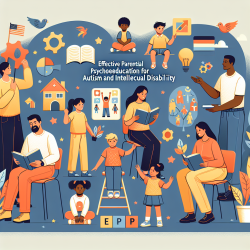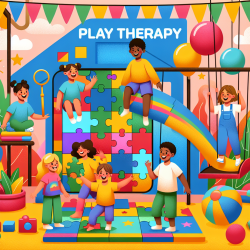The study involved 16 children with both autism and ID (A-ID) and 14 children with ID alone. Parents participated in eight fortnightly intervention sessions, focusing on areas such as improving eye contact, communication, object and color identification, behavior modification, and self-help skills. The children were assessed using the Indian Scale for Assessment of Autism (ISAA) and the Behavioral Assessment Scale for Indian Children with Mental Retardation (BASIC-MR) before and after the intervention.
Key Findings
- Significant improvements were observed in social relationships, emotional responsiveness, speech and communication, and overall behavior in children with A-ID.
- Children with ID alone also showed improvements in violent behavior, self-injurious behavior, repetitive behavior, and odd behavior.
- The PE module was well-received by parents, who noted positive changes in their children's behavior and communication skills.
Practical Implementation
For practitioners looking to incorporate these findings into their practice, the following steps can be particularly beneficial:
- Develop a Structured PE Module: Create a manualized PE module tailored to the needs of parents of children with A-ID and ID alone. Ensure that the module is simple, easy to follow, and can be individualized based on the child's specific needs.
- Focus on Key Areas: Include sessions that focus on improving eye contact, communication skills, object and color identification, behavior modification, and self-help skills. Use evidence-based techniques such as reinforcement and naturalistic learning.
- Engage Parents Actively: Encourage parents to participate actively in the intervention sessions and practice the techniques at home. Provide them with resources and support to help them understand their child's condition better.
- Regular Assessment: Use standardized assessment tools like ISAA and BASIC-MR to evaluate the child's progress before and after the intervention. This will help in measuring the effectiveness of the PE module and making necessary adjustments.
Encouraging Further Research
While the findings of this study are promising, further research is needed to explore the long-term effects of parental PE interventions and their impact on different developmental disorders. Practitioners are encouraged to conduct larger field trials and examine the specific tasks and duration of learning to optimize the intervention modules.
To read the original research paper, please follow this link: A Pilot Trial of a Manualized Psychoeducation Module for Parents of Children with Autism with Intellectual Disability and Intellectual Disability Alone.










